Jude the Obscure: Infinite Sorrow and Incomplete Desires
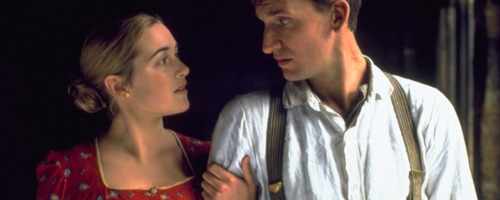
Thomas Hardy published his last novel Jude the Obscure in 1895. Originally, the novel appeared serialized in Harper’s New Monthly as The Simpletons and Enduring Hearts. The novel met with public outrage due to its dark themes, so Hardy never wrote another novel. Prior to the publication of Jude the Obscure, Hardy wrote several other novels including The Mayor of Casterbridge and Tess of the D’Urbervilles. His novels depicted characters struggling against their passions and social conventions: a “conflict between flesh and spirit” (King). Although many people argued that Hardy depicted a harsh and cruel portrayal of society, Hardy presented a more realistic, albeit brutally, and honest depiction of Victorian society.
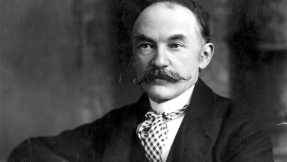
Hardy’s Jude the Obscure follows Jude Fawley, a poor orphan living with his Aunt Drusilla. Inspired by his former schoolteacher, Richard Phillotson’s decision to pursue an education at Christminster, Jude dreams of studying in Christminster and becoming a scholar. Enthralled in his studies, Jude captures the attention of Arabella, a country girl who tricks him into marriage by feigning pregnancy. Although Jude is trapped in a loveless marriage, he meets and falls in love with his cousin, Sue Bridehead. When Sue learns Jude is separated yet still married to Arabella, Sue decides to marry Jude’s former schoolteacher Phillotson, and gradually becomes dissatisfied with her marriage. Eventually, Sue leaves her husband to be with Jude, bearing his children. Because society disapproves of their relationship, Jude, Sue, and their family suffer from poverty. The doomed lovers find themselves incapable of living within society’s conventions, causing Jude and Sue to encounter ostracism and tragedy.
Thomas Hardy regarded the novel as a “tragedy of unfulfilled aims” (xiii). At the beginning of the novel, Jude yearns for a university education. However, as the novel progresses, Jude’s hopes and aspirations for an education dwindle. Throughout the novel, Hardy makes several indications critiquing the institutions of marriage, class, and education. While Jude attempts to pursue and accomplish his dreams and aspirations, the novel serves as a cautionary tale to prepare readers for the uncertainty that life provides.
From the beginning of the novel, Hardy provides symbolism, foreshadowing the fate of Jude Fawley. Even the title of the book sets the foreboding tone and reveals the novel’s themes. The Oxford English Dictionary defines the word “obscure” as “not illustrious or famous; humble.” Jude never departs from obscurity. Instead, he is forced to experience an unfortunate and miserable series of events through a society that does not permit Jude to go beyond his social class.
During the first few sections of the book, Hardy analyzes society’s role on education. After the failure of his marriage to Arabella, Jude decides to continue pursuing an education. Although he succeeds traveling to Christminster, Jude encounters his former schoolteacher Phillotson who now works as the village schoolteacher. Having inspired Jude to pursue an education, Phillotson admits to having given up on the idea years ago. Phillotson serves as Jude’s foil; because Phillotson never accomplished his goal of becoming a scholar, he decides to achieve a more attainable goal.
The reason Phillotson provides for capitulating his goals in furthering his education stems, arguably, from his low class status. The novel, therefore, brings into focus merit over privilege. In Jude’s case, he decides to write letters to five professors, in hopes of gaining admission to the prestigious university. Jude finally receives a reply from one of the professors, stating
…judging from your description of yourself as a working-man, I venture to think that you will have a much better chance of success in life by remaining in your own sphere and sticking to your trade than by adopting any other course.
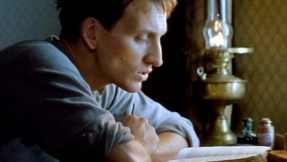
Rather than inspire Jude and provide him with the necessities to obtain an education, the figures of Christminster refuse to aid him. By advising Jude to remain in his social status, this action shows Jude that the university’s system is elitist. However, after Jude receives the rejection letter, he takes out a piece of chalk and writes on the wall of Biblioll College a passage from the Bible, 12:3: “I have understanding as well as you; I am not inferior to you: yea, who knoweth not such things as these?” This scene displays symbolic significance: the chalk functions as the tool of his trade as a stonemason, so by using the chalk to write on the sacred walls of Christminster, Jude follows the professor’s advice by remaining in his practice (424).
Admission into Christminster focuses on whether prospective students have wealthy means. The professor’s argument is based solely on the fact that Jude is poor, so he does not belong at Christminster. Money only proves to be an advantage to the privilege. In one scene, Jude attends a tavern and recites the Biblical Creeds in Latin after one of the undergraduates at the tavern challenges him. Jude delivers a spotless rendition and receives thunderous applause from the attendees, but Jude is incredulous, calling them fools (126).
Which one of you knows whether I have said it or not? It might have been the Ratcatcher’s Daughter in double Dutch for all that your besotted heads can tell!
This particular scene depicts inequality between the working class and the upper class. At the beginning of the novel, Jude decides to learn the Latin language. After writing to Phillotson, he receives a package of Phillotson’s old Latin textbooks only to realize that learning the language will not be an easy feat. However, after years of intense study, Jude masters the language. While Jude comes from a working-class background, this scene proves that Jude is just as smart (or smarter) as the members of the upper class. Although the undergraduates cheer at Jude’s recitation, he recognizes the university’s hypocrisy. While the upper class receives privileges to reach their goals, the working class strives to receive the same opportunities that the former takes advantage of. This scene allows Hardy to show the inequality between the classes: the working class deserve to be educated.
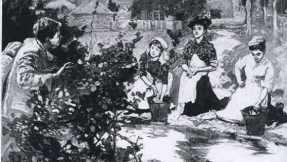
Hardy’s novel as a whole, however, critiques the idea of marriage. According to Amy M. King, Hardy repeatedly associates Jude with useless objects such as his old Latin books (xxvi). In doing this, Hardy projects the characteristics of each character (King). During their “courtship,” Arabella and Jude attend an inn and see a picture of Samson and Delilah hanging on the wall (Hardy 47). According to the footnotes provided in this edition, the image of Samson and Delilah serves as an image of betrayal. Not to mention that when Jude initially meets Arabella, she throws “a piece of flesh, the characteristic part of a barrow-pig” (39). Again, the footnotes provide an explanation: the flesh in question most likely refers to the pig’s penis. This image bears significance in symbolism. The pig’s penis represents sexuality; therefore, because Arabella throws the pig’s penis at Jude, she reveals her true character. By throwing the sexual organ, this shows that Arabella is more interested in having a sexual relationship between Jude than an intimate one.
Although some readers view Arabella and Jude as constantly at odds, the novel proves otherwise. Just as Jude strives for an education to ensure him a better life, Arabella does a similar thing. Prior to the imminent separation, Jude and Arabella need to kill a pig. When the pig-killer fails to arrive, Jude decides to perform the deed. Once preparations for the slaughter are completed, Jude feels uncomfortable killing the pig, “a creature I have fed with my own hands” (65). While Jude wants to grant the pig a quick death, Arabella disagrees, arguing that a slow death will not make the meat bloody.
Frustrated by the pig’s violent death, Jude kicks the bucket containing the blood, spilling the contents and angering Arabella. Jude is relieved that the pig is dead, but Arabella reasons that “Poor folks must live” (67). Although Arabella had proven to be a manipulative character, Hardy complicates matters and shows Arabella’s practical nature. Both make goals in order to survive; Arabella succeeds but Jude fails. Following the theme of marriage, Hardy repeatedly presents images of traps and its association with marriage. During their marriage, Jude realizes he has made a mistake. He compares their marriage to a “gin, which would cripple him, if not her also, for the rest of a lifetime” (63).
On the other hand, during her marriage with Phillotson, Sue resists having a sexual relationship with her husband. At Christminster, for example, Jude quietly observes Sue and Phillotson walking together after paying a visit to the vicar. Although Phillotson places his arm around Sue’s waist, Sue gently removes his arm (113). He soon replaces his arm on her waist only for her to have his arm remain there (113). Not only does this scene allow Jude to become aware of Phillotson’s feelings for Sue, but also foreshadows Phillotson and Sue’s relationship. As the story progresses, Sue and Phillotson wed, but Sue deprives Phillotson of having an intimate marriage. During Sue and Phillotson’s marriage, Phillotson wakes to find Sue not in bed but encamped in a large closet under the staircase (227). Phillotson is horrified to discover that Sue had fastened the doorknob with a piece of string, implying that she does not want to be disturbed, especially by Phillotson.
Later in the novel, Phillotson walks towards the room he once shared with Sue only to see her jump out the window (233). Although Sue tells her husband that she was frighten by something in her sleep, this interaction between husband and wife does not improve matters in their marriage. However, being married to Phillotson provides Sue with stability. After all, he was the one who provided Sue with an occupation as a schoolteacher. Both Jude and Sue are involve in unhappy marriages, yet they are both involve in a marriage based on survival. According to “Women as ‘the Sex’ in During the Victorian Era,” marriage was a mere necessity for survival. Thereby, love does not play a factor in Victorian marriages. Although Sue debates back and forth whether she should leave Phillotson, he provides for Sue and acquires a teaching position for her, encouraging her independent spirit. Their marriage is practical, but there is no love. Hardy criticizes marriages by arguing that marriages are based solely on practicality rather than companionship and affection.
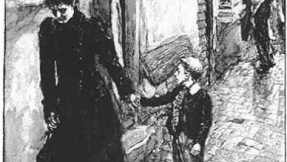
Eventually, Sue leaves her husband to be with Jude. The couple then are able to enjoy their relationship, having children but no immediate plans to marry. During those years together, Jude is reunited with his son with Arabella, known as “Little Father Time.” The few years of happiness abruptly ends when Jude and Sue decide to return to Christminster, finding difficulty acquiring a job and obtaining society’s approval of their situation.
At one point in the novel, Sue and Little Father Time discuss the financial situations that the family is currently struggling with. Since the family has struggled obtaining lodgings, Sue explains to Little Father Time that some lodgings object to children. Through the course of their discussion, Little Father Time discovers that having children “make so much trouble” (342). When Little Father Time says “I oughtn’t to have come to ‘ee– that’s the real truth! I troubled ’em in Australia, and I trouble folk here. I wish I hadn’t been born,” Sue replies to his outcry with “You couldn’t help it, my dear” (342). While Sue remains unaware of how her words influence the precocious youngster, Little Father Time takes the matter in his own hands. Because Little Father Time “couldn’t help” being born, he takes action by taking his own life away. Sue and Jude’s happiness ends when they discover the suicide of Little Father Time and the death of the other children. For Little Father Time, his motivation from his actions derive from the fact that he believes he is helping Jude and Sue. After all, written on his suicide note is, “Done because we are too menny.”
According to Paxton Price, while children from the upper class received education and were provided for, the lower class endured a difficult childhood. Due to a low income, the children often had to work in factories and earn wages to make ends meet. Because Jude and Sue never married, this lead to worse hardships. Sue gave birth to two children out of wedlock, so she and Jude have difficulty finding a stable job, struggling to raise money and support their children. In an attempt to assuage his parents’ financial fears, Little Father Time took his siblings and his own life to allow a better life for his parents.
The death of their children scar Jude and Sue’s relationship. It is only until the novel’s end that Sue succumbs and engages in a physical relationship with Phillotson, believing that it is her duty. In Jude’s case, he returns to Arabella and dies after hearing the festivities of Remembrance Day, the last day that marks the end of an academic term, referring to the end of Christminster’s term. Jude’s last moments, hearing the shouts of Remembrance Day, serve as a failure to achieve his goals and aspirations. Despite the novel’s Victorian setting, Jude the Obscure still carries pertinence in contemporary society. Not only does Hardy present a realistic yet cruel portrayal of Victorian society, but he also tells a story of survival. A story complete with the uncertainties which life might bring and the happiness and disappointments that often follow.
Works Cited
King, Amy. Introduction and Notes. Jude the Obscure by Thomas Hardy. 1895. New York: Barnes and Nobles Books, 2003. Print.
“Obscure.” Def. 6. Oxford English Dictionary. OED, n.d. Web.
Paxton, Price. “Victorian Children in Victorian Times.” Victorian Children. 11 Dec. 2012. Web.
“Women as ‘the Sex’ During the Victorian Era.” Victorian Women: The Gender of Oppression. n.p., n.d. Web.
What do you think? Leave a comment.











I have always been a fan of the classics, and this is one of my favorites.
This book was the first I had ever read of Hardy’s works and I loved it. It is rich with imagery and contains clandestine symbolism throughout the entire work, Hardy paints a perfect nightmare.
Brownlee
Jude the Obscure is one of the most depressing novels in all of literature. Although I don’t dispute that literature, like other art forms, need not be merely entertainment, the emotions evoked from this book, while a testament to Hardy’s skill, are not for everybody.
Not sure why this book is titled “Jude the Obscure.” I think “Jude the Dreamer” or “Jude the Dumb-ass” may have been more appropriate!
I was told this book is depressing and I wasn’t sure why at first. Sure, Jude the main character was continually down on his luck, but average folks back in the 1800s had pretty low expectations and he never seemed too bothered about it.
I was so annoyed with the last quarter of this book. It seemed to get so messy. Sue’s selfishness was on my very last nerve by the end.
This is a great piece. Very well written and thought through.
At times, I found that I just could not go on with this book and came so close to abandoning it when it just seemed to be so miserable and depressing. But I held out, and whilst when it could not seem to get any worse for Jude and Sue, it does.
Fantastic study.
What I personally found so frustrating about this book were the ups and downs of Sue and Jude’s relationship. The inner workings of Sue’s mind drove me insane, and her extreme logic about every little thing was indeed a curse. But nobody understood Jude more than Sue did, nobody came even close! I also thought it was so sad that Jude and Sue only really had one true friend – the Widow Edlin, ever present and always speaking the truth, especially when nobody wanted to hear it.
Lots of the philosophy, the anti marriage and “morality is what you feel is right” made me uncomfortable.
I think the most enlightening part of this book for me is how everyone else treated Jude and Sue when they left their spouses to live together, refusing to marry each other because of the misdeeds they felt marriage did to them in the past.
They were treated terribly and it made me think about how I treat others who choose to live differently than me. Because someone makes decisions I think are immoral, does society around them have a right to make it so they can’t make a living wage? Of course not. It is not for people around them to judge or punish.
While I say that the Jude and Sue’s thoughts on marriage were wrong, so were everyone else’s in the novel, it seemed. When Sue went back to Phillotson, he was aware that she was doing it out of duty and did not have any feelings for him. He still pushed the marriage ahead, hopeful that marriage would magically make her love him back. Arabella tricked Jude into marriage at first and then remarriage, and then pouted when things went wrong. She too seemed to think that marriage would just make everything right that was wrong, misunderstanding that good marriage comes from work and love and care.
Thank you fir the very well written article it kept my attention and I wanted to know more. It is good to see their us some progression in society. For example marriage is no longer a means for survival. Thus is due to liberation for women and the opportunity to seek an education and vocation. Also the opportunity exists that education can be accessible to many more people than just those who are from a privileged families. Very nice job.
Nice article, well analysed and well written.
I did enjoy the bleakness of it all. Father Time’s action came to a shock to me and was actually quite hilarious in how over the top it was. And I really liked the circle of free-thinking Sue poking holes in Jude’s dogmatic religious views, with Sue later then being coerced by society into becoming highly religious after all the trauma and the freed Jude having to deal with that.
So depressing. This novel shows how we can make mistakes doing what we feel is right at the time and then life is forever changed. I liked your stayement about how this novel is a cautionary tale of how life does not go as planned and our dreams may not come true. I still cling to hope that my dreams will, but books like this depress me. I also find it so sad how a flippant remark by Sue ended in so much death and heartbreak. Goes to show that we need to be considerate to our fellow humans, since you never know what could destroy them.
Hardy’s women are so spot on, you almost forget that the author is male, so accurate are his portrayals of women: their mannerisms, their morals, their thoughts, their despair.
This book is so dark and disturbing – I love it. Great article, with such attention to detail (I particularly liked your analysis of Jude’s writing with chalk on the walls of the university buildings).
I’m seeing why the average reader thought of the work as very dark.